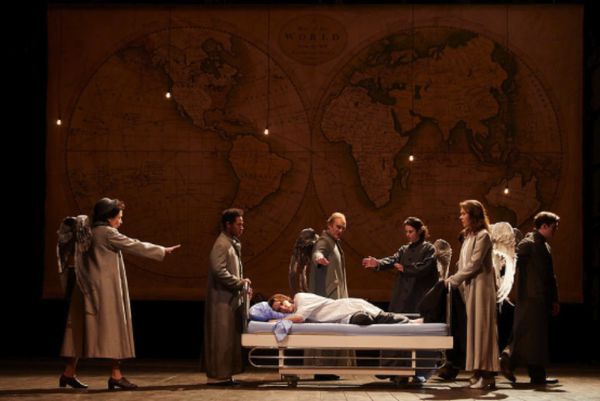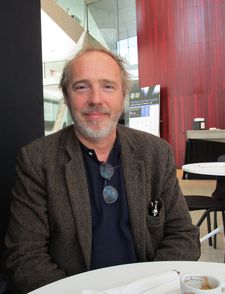In the final instalment of my in-depth conversation with Arnaud Desplechin on Oh Mercy! (Roubaix, Une Lumière), which received six César nominations, we discussed how a Bob Dylan album and a joke by Kent Jones inspired the title. The director and co-screenwriter (with Léa Mysius) spoke about the influence of Emmanuel Lévinas, the performance by Lumière winner Roschdy Zem as Commissaire Daoud, the costumes by Nathalie Raoul (My Golden Days, Kings & Queen, Cédric Kahn’s Wild Life, Paul Verhoeven’s Elle starring Isabelle Huppert), and the dynamic between Sara Forestier as Marie and Léa Seydoux as Claude.
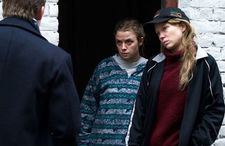 |
| Lieutenant Cotterel (Antoine Reinartz) confronts Marie (Sara Forestier) and Claude (Léa Seydoux) |
Anne-Katrin Titze: Now we’ve chatted more about the animals than about your marvellous actresses. I would like to talk about the frown. The permanent frown on Sara’s face. And then it disappears.
Arnaud Desplechin: Yeah, she’s a genius. You know, there’s an absolute opposition between Marie [Sara Forestier] and Claude [Léa Seydoux]. Marie is the lover and Claude is the beloved. And the two tasks of love are absolutely separated. The lover would never be loved. The beloved will never love anyone. There is the Beauty and the Beast. Now, Sara Forestier, I think in my humble opinion, is really really pretty.
AKT: Yes, I thought that was exactly the point. You are not talking about a stereotypical beauty-beast contrast, because they are both beautiful.
AD: Yeah, and so we had to find a way of setting up the opposition between ugly and beautiful. The two girls are lovely in real life. How to brutalise the face? Perhaps Marie had been through a tougher life than Claude. So we had fake teeth, but not too obvious, not to transform her into a Quasimodo. A slight detail, slight scars here and there.
I always said to Sara “I need your whole face to play the part. You have so many expressions.” In so many ways, Sara is an expressionist actress. While Léa is a naturalistic kind of actress. She’s not expressionist at all. So I loved the opposition in the acting approach.
AKT: That’s great.
AD: So when I had the nakedness of Sara’s face, she could play on that with a frown, with the anger and the rest at the end of the movie when she’s falling asleep in the car which is bringing them into jail.
AKT: Also the juxtaposed costumes [by Nathalie Raoul] you gave the two. For Léa, you have the leather jacket. She is in a structured form, with a toughness. And then there is this mouse-grey sweater that is just hanging on Sara.
AD: It’s so pitiful on Sara! But we had to. The poverty. That’s how people are dressed in real life. I thought also the leather jacket that Claude is wearing had a sort of a story. I think the character of Marie is white trash. The character of Claude I’m not that sure that her family was that poor. Anyhow it’s played by Léa Seydoux who belongs to the bourgeoisie. So I liked to dream about Claude when she was about 15, thinking it’s cool to do that.
It’s cool to have a leather jacket and go to a metal rock festival, it’s cool to stay in the cheap housing. It’s cool to have a kid with anyone. It’s cool to sleep here and there. And then she arrives in her thirties and it’s not cool anymore. It’s finished. So this jacket was carrying all this journey that she had before, thinking “It’s cool, I’m streetwise.” No, you are not wise at all, you are just lost. She realises that at the end of the movie.
AKT: The lights are prominent in the original French title. There’s a beautiful moment when the Christmas lights look like an earring for Marie. The ornament turns into her adornment. There are lights from the get-go. How did the English title Oh Mercy! come about?
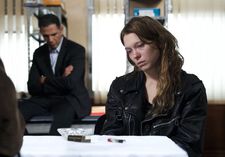 |
| Arnaud Desplechin on Commissaire Daoud (Roschdy Zem) with Claude (Léa Seydoux): “This jacket was carrying all this journey that she had before, thinking ‘It’s cool, I’m streetwise.’” |
AD: It came through a joke.
AKT: A joke?
AD: Sort of. When Wild Bunch had the movie, as soon as I finished the script, they published in Variety “We are representing Roubaix, A Light.” No one knows in England, in Germany, in the US, where Roubaix is. And the joke was coming from Kent [Jones] who said “Arnaud, you won’t seriously call your film Roubaix, a Light?” He was impersonating the big voice-over that you have in the American trailers, you know.
I thought, okay, now I have to find a title that could speak to anyone. There is this line by Louis, the young lieutenant, in the voiceover: “A pity beyond all telling is hid in the heart of love.” Which is a quote from Yeats. And I was thinking, pity for a film doesn’t work.
So I was obsessed by that during shooting. After ten days of shooting in the morning I woke up and I remembered Oh Mercy, the Bob Dylan album. Roubaix, A Light could have been called Daoud, a Light. Daoud brings the light in a very desperate situation.
It worked in English because you have the merciful, And the guy is North African, so the merciful sounds nice. Because of the Koran etc. The two titles, the international title and the French title in a secret way have Daoud in the title. Daoud, the merciful or Daoud, the light, being Roubaix, impersonating the whole city. For me there was a balance between the two titles. In the opening you see both titles, Oh Mercy! and Roubaix, A Light.
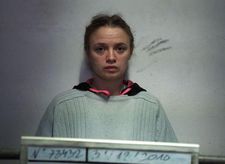 |
| Arnaud Desplechin on Sara Forestier as Marie: “I had the nakedness of Sara’s face, she could play on that with a frown, with the anger and the rest …” |
AKT: The film asks for mercy for people who live under the circumstances you describe. There is a Lévinas book we see at one point. Is it an aside or is there more to it?
AD: There is a line in the film that I love. Daoud often has very plain lines and when you start to observe them, you realise they are more complicated than they look. Right after Lucette has been murdered, the doctor is taking the body out. Any other cop would have said “Let’s meet at the autopsy.” And Daoud doesn’t do that. He says “Could you stop, I would like to see her face.” To take the time to look at the visage.
Thinking about visage, I was thinking about Lévinas, for sure. What Daoud is going to do with the two girls to get more truth is fighting for someone. He is fighting for a woman, 85 years old, killed in a not humane way, killed in a bestial way. He needs to see the face of the victim to know what he is fighting for. And that attention, the fact of caring about the faces of other people, I think, is coming from Lévinas.
AKT: Yes, about the face-to-face. I like so much how you use books and quotes in your films. Philip Roth’s American Pastoral in the last one [Ismael’s Ghosts]. It’s so good to see an interaction between a book that I like and a film that I like. With you, it’s not name-dropping.
AD: I don’t think it’s name-dropping. You know, the film is a two-parts film, which is always difficult to edit. The first part is embracing the whole life of the city.
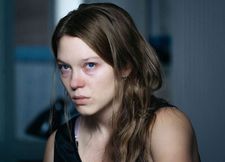 |
| Arnaud Desplechin on Léa Seydoux as Claude: “You are not wise at all, you are just lost.” |
AKT: The arson and the rapist at large.
AD: The rapist, which is obviously terrifying. Then the story of the runaway girl. You’ve got all these different kind of stories. After a while the murder happens. Now the film is focusing and focusing just to have two close-ups. One close-up on Marie, one close-up on Claude. That’s it. The camera starting with everything large and becoming a microscope. Now that you are focusing on just two faces, because I think, I deeply think, that human beings have souls, it’s becoming more gigantic than the opening.
AKT: I agree.
AD: Which is the mystery of souls. Which is even larger than the mystery of a city. That’s where I thought that Lévinas was relevant.
AKT: Tell me about your staging of Angels In America!
AD: It’s an adaptation that I wrote and that Kushner gave me the authorisation to create in La Comédie-Française. It’s a long show. I did one Strindberg [The Father] there. Strindberg is easy, it’s a Kammerspiel. It’s not a big deal. This time it’s so epic.
 |
| Léa Seydoux in New York for Abdellatif Kechiche’s Blue Is The Warmest Color Photo: Anne-Katrin Titze |
All these sets and characters and changes of costume. For me it’s an absolute fulfilment to do that. Strangely enough I can see a link between the political, the social, not involvement - I’m not a political man. The fact to care about what Dostoyevsky called “the humiliated and offended.”
AKT: Did you see Matt Tyrnauer’s great documentary Where’s My Roy Cohn?
AD: I have to see it. I think the actor [Michel Vuillermoz] who will play Roy Cohn in my production won’t like to see it. The way of French acting is so different from the way of American actors. I’m sure that he won’t base his representation on Roy Cohn, I think he will dig in Richard III. The evilness of Richard III, I think will be great inspiration.
Read what Arnaud Desplechin had to say on editing and composer Grégoire Hetzel for Oh Mercy! (Roubaix, Une Lumière) and a Cries & Whispers scene.
Read what Arnaud Desplechin had to say on reality, childhood, filming animals for Oh Mercy! (Roubaix, Une Lumière) and Henry Fonda in The Wrong Man.
Angels in America, directed by Arnaud Desplechin, runs through March 27 at the Salle Richelieu of the Comédie-Française.
The César Awards will be announced on February 28.








